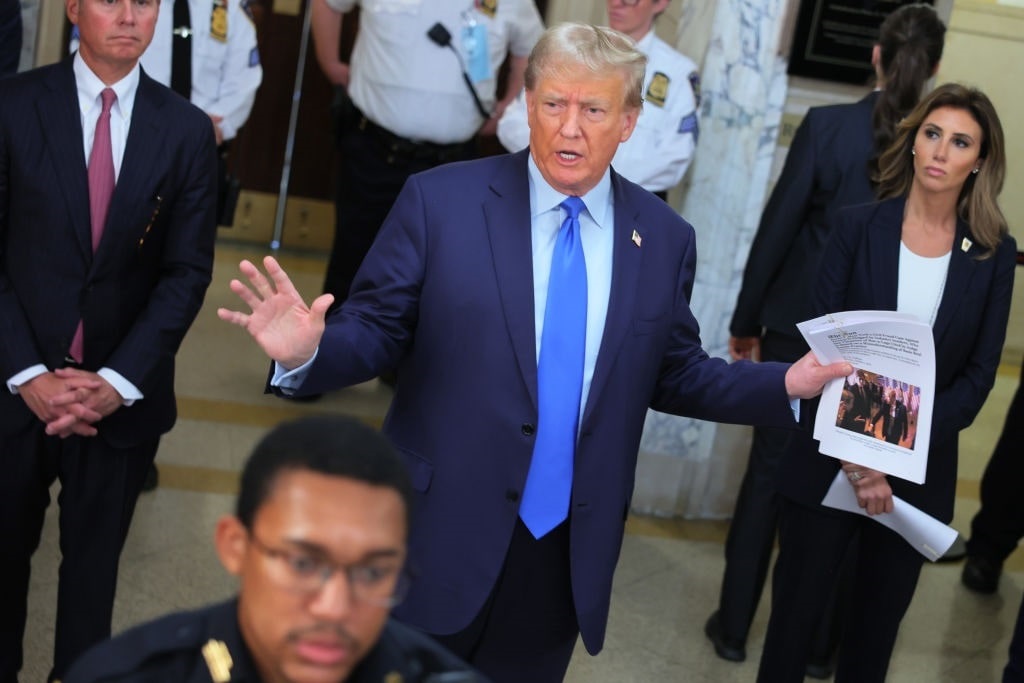Donald Trump appeared in the Manhattan courtroom of Judge Arthur Engoron on civil charges accusing the former president of a decade-long fraud campaign on Monday (Oct. 2). A year ago, New York’s attorney general, Democrat Letitia James, filed suit against Trump, his son Eric, and other individuals and corporations, alleging they “committed repeated and persistent fraud” through “false and misleading financial statements,” in violation of state law, from 2011 to 2021. New York law allows the state’s attorney general to file civil suits against malignant actors and businesses to prevent their further operation and “collect restitution and damages” against them.
The former president was only too keen to discuss both the trial and political ramifications throughout the lengthy day. Trump told a media scrum assembled at the courthouse, “This is a continuation of the single greatest witch hunt of all time.” He called Engoron a “rogue judge,” saying, “He’s interfering with an election, and it’s a disgrace!” He also called James a “racist attorney general,” pointing out that she has used “getting Trump” as a campaign rallying call multiple times. He said the Biden Department of Justice had coordinated the prosecution of many cases against him.
James countered his claims by releasing a statement, insisting:
“For years, Donald Trump falsely inflated his net worth to enrich himself and cheat the system. We won the foundation of our case last week and proved that his purported net worth has long been rooted in incredible fraud.”
Already Decided?
Trump entered the courtroom already having lost the case, as James referenced. Engoron issued a ruling last week that declared as a matter of law that Trump did engage in multiple instances of fraud. They included inflating the value of real estate on various applications while minimizing the values of others, all to his financial benefit. Notably, Engoron savaged Trump’s attorneys in his order, fining each one $7,500 for submitting “repetitive and meritless motions.”
However, the former president did reserve guarded praise for the judge’s apparent comments towards the end of the court day. “The last five minutes was outstanding because the judge essentially conceded that the statute of limitations, that we won at the court of appeals, is in effect,” Trump said. “Therefore about 80% of the case is over.” Trump was referring to an exchange with the judge who asked why testimony was being given regarding accounts from 2011 when the statute of limitations meant such issues were not under the purview of the trial. Indeed, it seems that only claims from 2014 onwards are under scrutiny.

Donald Trump (Photo by Michael M. Santiago/Getty Images)
What’s left to try if the judge has already decided? There are still some charges Engoron hasn’t ruled on, and then there is the central issue of damages. James’ complaint asks for more than $250 million, plus interest, from Trump and his co-defendants as a disgorgement award, returning all financial benefits from the fraudulent practices. Trump will likely appeal this court’s rulings and judgments in multiple venues, and if so, he will want any damages award to be as low as possible.
Still a Civil Case
James has tried to interest federal criminal prosecutors and the IRS to come after Trump on the facts of this case, unsuccessfully referring him for prosecution. If he were charged with criminal fraud, Trump would be innocent until proven guilty beyond a reasonable doubt. Instead, the plaintiff here, the attorney general, needed to prove the case against him by mere preponderance of the evidence, sometimes referred to as “more likely than not.” The former president can’t be sentenced to prison if he is defeated in this case, but he can lose his businesses and hundreds of millions of dollars.
Trump voluntarily attended the proceedings on Monday. However, the trial is expected to last several weeks, and the court may later compel Trump’s presence and testimony. If he is forced to attend, there is little doubt that he will again claim he is being purposely held away from the campaign trail.




